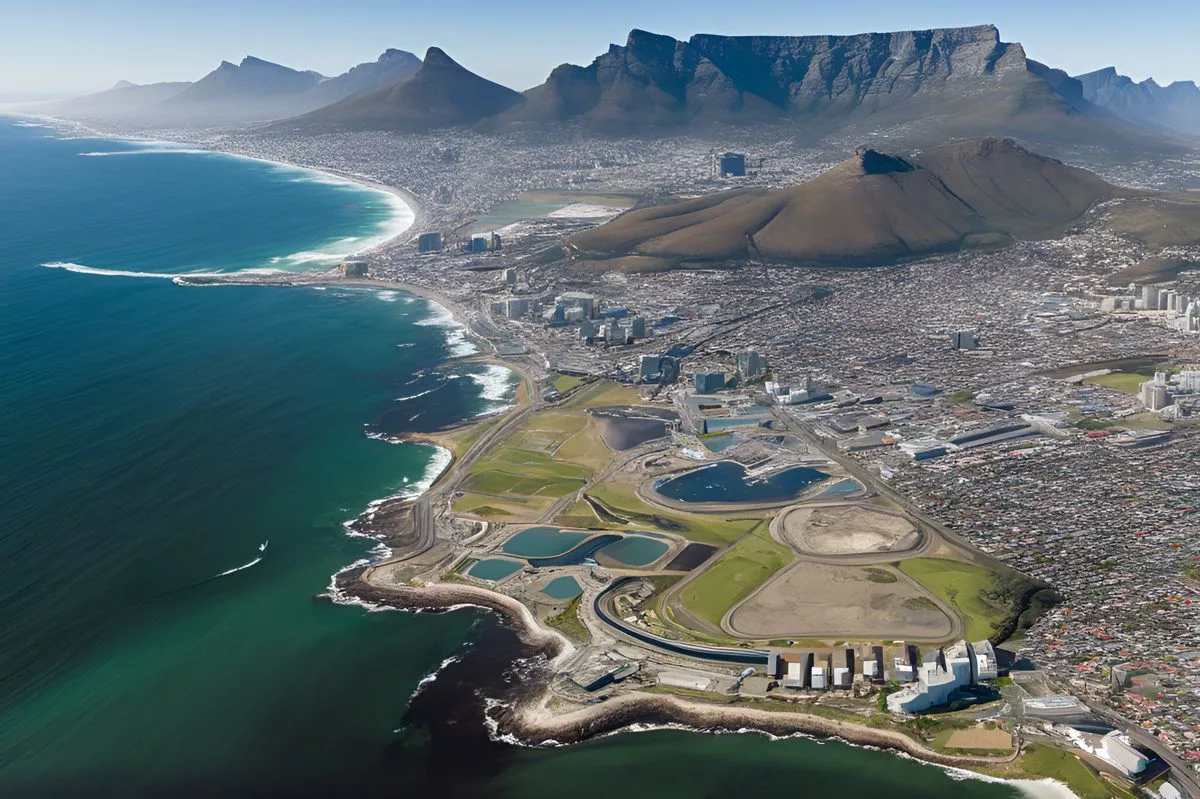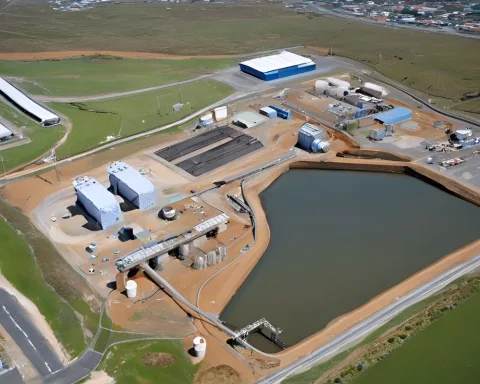Cape Town is facing a serious sewage crisis, with around 32 million liters of untreated sewage flowing into the ocean every day. This pollution threatens the beautiful beaches and the health of people who visit them, especially at popular spots like Camps Bay and Hout Bay. Though the city has started a plan to improve its water systems, experts agree that quicker action is needed to tackle this urgent issue. As Cape Town works to fix its sewage problems, it highlights the need for cities everywhere to find smart and sustainable solutions to protect their environments and communities.
What are the sewage challenges facing Cape Town?
Cape Town is confronting a critical sewage crisis, with approximately 32 million liters of untreated sewage entering its oceans daily. This alarming situation jeopardizes marine life and public health, particularly at popular beaches like Camps Bay and Hout Bay, necessitating urgent infrastructure upgrades and sustainable solutions.
A City of Contrasts
Cape Town, with its stunning Table Mountain backdrop and renowned beaches, is a city where natural beauty meets urban energy. Locals and visitors alike flock to these shores, seeking refuge from the sun in the cool ocean waves. Yet, beneath this idyllic setting lies a looming environmental and public health issue demanding immediate attention.
Recent concerns have emerged about the water quality along Cape Town’s stunning coastline. The once-pristine beaches near Green Point, Sea Point, and Hout Bay are now threatened by the rising presence of untreated sewage entering the ocean. For years, this practice has continued, putting the environment at risk. The FF Plus party has spotlighted this issue, stressing the urgent need for action. They’ve revealed that around 32 million liters of sewage have been poured into the ocean daily since last year.
This problem isn’t new, echoing a long history of neglect in sustainable urban planning that cities worldwide have faced. The failure of systems like the recent breakdown at Sea Point highlights the vulnerability of outdated infrastructure. An ever-growing population adds further strain to Cape Town’s sanitation systems, making the search for immediate, innovative solutions even more pressing.
The Impact on Camps Bay and Beyond
Camps Bay, celebrated for its picturesque beaches and lively atmosphere, faces its own sewage challenge, with about 2 million liters entering the ocean daily. This alarming figure doesn’t just threaten marine life; it poses a significant risk to the health of millions of beach visitors each year. Cape Town’s beaches are cherished for their natural charm, but the unseen danger of pollution casts a shadow.
Acknowledging the severity of the situation, Cape Town’s metropolitan council has initiated a 2024 water management strategy. This plan seeks additional support from the National Treasury to upgrade the city’s water infrastructure. Despite these steps, experts like Dr. Jo Barnes from Stellenbosch University emphasize the need for swifter action. Her research points to concerning levels of E. coli in the Disa River, which flows into Hout Bay Beach, highlighting the gap between projected and actual consequences of sewage leaks. Dr. Barnes argues that the city must show stronger commitment to resolving these pressing issues.
Reflecting on urban sanitation history reveals recurring challenges in growing cities. The Industrial Revolution significantly impacted urban expansion, often outpacing infrastructure development. London’s infamous Great Stink of 1858, caused by sewage buildup in the River Thames, stands as a historical lesson. It prompted the city to invest in comprehensive sewage systems, illustrating the importance of proactive infrastructure planning.
Beyond Technical Solutions
Improving sanitation in Cape Town requires more than just technical fixes; it involves addressing social inequalities, especially in informal settlements with inadequate infrastructure. The city’s diverse population and rapid growth call for a comprehensive approach to urban development, balancing economic progress with environmental responsibility.
Local artists often capture Cape Town’s stunning landscapes and vibrant culture, but they also highlight its challenges. Their works reflect the complex relationship between humans and their environment, urging a collective movement toward sustainable living.
Cape Town faces a critical decision about its sewage issues. Investing in modernizing wastewater treatment systems is both an environmental necessity and a moral imperative. The estimated R8 billion needed to upgrade facilities represents a significant investment, but it promises long-term benefits. This commitment offers a chance to align the city’s growth with principles of environmental sustainability and public health.
A Path Forward
The story of Cape Town’s beaches goes beyond sun, sand, and surf. It tells a tale of resilience, community involvement, and the pursuit of harmony between urban development and nature. As the city navigates sewage management challenges, it also embarks on a journey toward a more sustainable future. Collaboration among policymakers, scientists, and residents is essential for preserving Cape Town’s natural heritage.
The urgency to address sewage disposal in Cape Town mirrors global challenges faced by cities in the Anthropocene era. As urban centers expand, innovative solutions are necessary to maintain the delicate balance between human activity and ecological preservation. Cape Town’s narrative serves as a microcosm of this global story, urging cities worldwide to prioritize sustainable development.
In conclusion, Cape Town’s environmental challenges demand immediate attention and action. By investing in sustainable solutions and fostering community collaboration, the city can protect its natural beauty and ensure a healthier future for its residents and visitors alike.
FAQ: Cape Town’s Sewage Crisis
What is the current sewage crisis in Cape Town?
Cape Town is facing a significant sewage crisis, with approximately 32 million liters of untreated sewage being discharged into the ocean daily. This pollution poses serious risks to marine life and public health, particularly at popular beaches like Camps Bay and Hout Bay, highlighting the urgent need for infrastructure improvements and sustainable solutions.
How does untreated sewage affect Cape Town’s beaches?
The untreated sewage entering the ocean threatens the water quality and safety of Cape Town’s beaches, particularly impacting the health of the millions of beachgoers who visit each year. High levels of bacteria, such as E. coli, have been detected in areas like Hout Bay, posing health risks to residents and visitors alike.
What steps is the city taking to address the sewage issue?
Cape Town’s metropolitan council has initiated a 2024 water management strategy, seeking additional support from the National Treasury to upgrade the city’s water infrastructure. However, experts stress that swifter and more decisive action is necessary to address the immediate risks associated with the sewage crisis.
How has the sewage crisis developed over time?
The sewage crisis in Cape Town is not a new issue; it reflects a long history of inadequate urban planning and infrastructure neglect. With the city experiencing rapid population growth and outdated sanitation systems, the pressing need for innovative solutions has become increasingly clear.
What are some broader implications of Cape Town’s sewage crisis?
Cape Town’s sewage crisis is indicative of larger global challenges faced by urban centers in the Anthropocene era. As cities expand, the balance between human activity and ecological preservation becomes fragile. Cape Town’s struggles emphasize the need for cities worldwide to prioritize sustainable development and environmental responsibility.
How can residents and communities contribute to resolving this issue?
Community involvement is crucial in addressing Cape Town’s sewage crisis. Residents can advocate for sustainable practices, support local initiatives, and engage in conversations about urban planning. Furthermore, artists and activists can raise awareness about the environmental challenges facing the city, fostering a collective movement toward sustainability and environmental protection.











